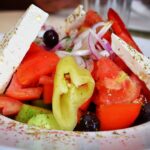Why is the Mediterranean diet ranked as the best diet plan in the world and why all other diet programs comes only in second place when compared to it?
Maybe you’re sick and tired of your body figure or overweightness and have decided to look for weight-loss solutions online, but stumbled upon a gamut of ill-advised weight-loss tips and tricks that don’t do squat. Well, I’m pretty sure that a lot of us have been there and done that and are still scratching our heads trying to figure out the “best” way to eat.
The truth is there are many different ways to eat, 2 of the most popular are the Mediterranean diet and the Paleo diet cater to different tastes and health goals. The Mediterranean diet emphasizes on consuming fresh organic foods such as vegetables, grains and seafood, and in moderation; however, it does not limit any food that you can eat. Meanwhile, the Paleo diet also emphasizes on eating fresh fruits and vegetables, but is also friendly to meat, poultry and seafood which the Mediterranean diet says you need to eat less of. The Paleo diet does not recommend people to eat any grains and dairy products.
The Mediterranean diet has been consistently utilized for centuries and has a large body of evidence behind it. On the other hand, the Paleo diet is somewhat a resurrected diet from the remote antiquity. It was started around the 1970s by gastroenterologist Walter Voegtlin with the idea that Paleolithic ancestors, who lived in a range of time from 2.5 million to 10,000 years ago, could teach modern men how to eat healthy. Both diets are praised by health experts for having lots of healthy fats and low carb in their food preference, with an emphasis on eating whole foods. But do they have any differences or unique attributes that sets them apart from each other? Maybe the science behind them can answer.
Though quite different in their approaches, both diets are healthier when compared to the standard American diet that can have a life-changing impact in your life. This becomes more evident when the focus of the diet is on fresh, whole foods rather than processed foods.
The Mediterranean Diet
The Mediterranean Diet is based on the principle about how people residing in the surrounding areas of the Mediterranean Sea seems to have a lower risk of heart disease and live longer and healthier lives per capita than anywhere else on the planet. The diet encourages people to eat plant-based foods and whole foods, while discouraging the consumption of processed foods.
Fruits, vegetables, and vegetarian proteins are advised to consume in large quantities while whole grains, meat, and dairy are recommended to be eaten in small amounts and moderation. Unsaturated fats or healthy fats are also encouraged to be eaten – these are usually found in some nuts, olive oil and fish. The diet has been known to lower the risk of coronary heart disease, lower blood pressure, reduced amounts of low-density lipoproteins (LDL) otherwise known as bad cholesterol. Patrons of the Mediterranean diet are very happy with the diet, because it’s very easy to follow and the best thing about it is that it doesn’t exclude any food groups, so food consumption is quite flexible. You’d barely hear any criticisms or debunkers about it, but still, do visit your dietician or health professional and get their opinion about it first before making the switch.
The Paleo Diet
The Paleo Diet or caveman diet first appeared in US media back in the 1970s. It recently became popular due to the latest discoveries about how Paleolithic (cavemen) people ate and stayed healthy throughout their lives. Scientists are also baffled as to how cavemen had perfect teeth despite not having any dental care millions of years ago, or maybe we’re still yet to discover it! Wouldn’t that be something? The idea behind the diet is that we should be eating like our ancestors did, prior to the discovery of farming and how we gradually shifted from eating meat, poultry, fish, fruit, vegetables, and nuts to now eating dairy, grains, and legumes. The best thing about the Paleo diet is that it isn’t restrictive and doesn’t emphasize on how many calories you consume, but instead shifts its focus on eating nutritious whole food. Much like the Mediterranean diet, it too rejects the consumption of processed foods.
Despite the positive reception of the Paleo diet with its avid followers, it still lacks any hard scientific studies to back up its claims on helping with weight-loss and other health benefits. However, compared to the Mediterranean diet, it is more satisfying when you talk about the calories eaten. Still, critics worry that it’s too restrictive and difficult to follow. One issue that bothers them so much is the fact that the Paleo diet excludes legumes and whole grains, which are high in dietary fiber, vitamins and minerals.
The Science
A new research has been recently published in The American Journal of Clinical Nutrition with the aim of determining which diet regimen showed the best results in losing weight. The experiment brought in 250 healthy test subjects who were mostly overweight adult women with an average age of 44. The test subjects were allowed to follow any known weight-loss diet plans for the next 12 months in order to lose as much weight as they possibly can. The diet plans included Mediterranean diet, Paleo diet or intermittent fasting. Upon selecting their diet preference, they are then introduced to a health professional and a dietitian in order to prepare them for the weight-loss training and how to incorporate the diet into their daily life. The Mediterranean diet’s principle is focused on eating plant-based foods, fish and whole grains, while recommending a reduced amount of red meat and processed grains consumption. Intermittent fasting, on the other hand, requires you to do 5 days of your normal diet (no food restrictions), then dedicate the 2 remaining days of the week to fasting (commonly called 5:2). Finally, the Paleo diet is somewhat similar to the Mediterranean diet and it encourages its followers to eat more meat, fish and healthy fats, together with fruits, vegetables and legumes. But it views grains and processed grains negatively which is why they advised not to eat these foods as much as possible. For the next 12 months, each test subject’s diet patterns, workout routine, and periodic check-ups were recorded that included their weight, body fat percentage, blood pressure and hemoglobin A1C (it is a kind of blood test which measures and monitors a person’s blood sugar level over a period of time in order to determine their risk of developing diabetes).
What They Found
About 12 months later, the researchers tallied the overall results of the participants and grouped them according to their diet plan preferences. The diet plan that has the percentage of people adhering to is the Mediterranean diet, with 57% out of the total number of test subjects that chose to follow it. Intermittent Fasting came in at close second with 54% adhered to the diet program out of the total number of test subjects’ adherence, and finally the Paleo diet took the 3rd spot with only 35% of the test subjects stuck to this diet regimen. As far as weight loss is concerned, the Intermittent Fasting group showed the most promising results, with an average loss of 8 pounds among the test subjects. In this category though, the Mediterranean came in at 2nd place but still showed an impressive 6 pounds of weight drop among the participants on average! Meanwhile, the Paleo diet once again took the last place in the competition with test subjects from this group exhibiting nearly 4 pounds of weight loss. The researchers noted that some adjustments were needed to be made regarding the test subjects’ weight loss data to account for the people who dropped out of the study, but it was only a few pounds. Aside from weight loss, the Mediterranean diet scored some impressive health benefits that the researchers were not even looking for in this study! The Mediterranean diet group saw a significant drop in their systolic blood pressure by 6 points which is proof that this diet plan does indeed reduce the risk of developing cardiovascular disease. It also reduced their hemoglobin A1C which means they are far from getting type 2 diabetes, while losing weight to get healthier. For the group belonging to Intermittent Fasting, they also show a slight drop in their blood pressure; however, they did not experience the same benefits when it comes to reducing the risk of developing type 2 diabetes like the Mediterranean diet group did.
What It Means
While the Intermittent Fasting group were the winners when it came to the most weight loss category (mind you, it could still be skewed), the benefits that the Mediterranean diet bestowed its followers was more noteworthy. Even though the goal of the study is weight loss, what the researchers are actually after is what health benefits losing weight will bring, and the fact that the only Mediterranean diet was able to help reduce the test subjects’ blood pressure and A1C, means that it has already achieved this goal. Additionally, the Mediterranean diet was the least restrictive diet to follow.
However, you should stick to a diet program that suits your lifestyle. A lot of people find it hard to fast 2 days a week or adhere to a self-imposed restrictive diet that bars them from eating some foods that they’ve been fond of for a long time now. The Mediterranean diet offers flexibility between the other 2 diet plans that was employed in this study. As long as you eat the meals in the Mediterranean diet in small portions and in moderation, then you can eat almost anything you desire!
The Bottom Line
We’re very fortunate that this study was made and it showed us that you can choose various diet plans that can help you live a healthy lifestyle. Perhaps the most difficult thing to do is to really adhere to a specific diet program, especially if it has some food restrictions. If you’re planning to shed off some pounds from your weight on a short-term goal, then all of these diet programs can help you achieve that. If you want an unrestricted diet and yet get all the health benefits far beyond weight loss, then you should try the Mediterranean diet.
Changing your diet patterns to lose weight and become healthy should not stress you out. By making sure you only eat fresh fruits and vegetables, as well as whole foods, nuts and olive oil is a great, proven way to get started on any weight loss diet.
How Is The Mediterranean Diet Different From The Paleo Diet?
Actually both diet programs will help you to lose weight effectively and they also promote a healthy lifestyle. The Mediterranean diet and the Paleo diet encourages their patrons to eat whole and natural foods, while eliminating all processed and refined foods from your diet. Both diet plans also remove sugar and artificial sweeteners from the food you eat and give you alternatives like natural sweeteners and encourage you to consume them in moderate amounts.
Although these 2 diet plans have certain similarities, there are significant differences that can be seen when you make a side-by-side comparison. Here are some of them:
- Goal Setting – Both diet programs agree on certain things like eating whole foods, removing all kinds of processed and refined foods from your diet. But the Paleo diet’s goal is to eliminate foods that cause inflammation in our body and allow it to heal naturally. No inflammation equals to a healthy body. The Mediterranean diet on the other hand, has no specific goals in particular and this is where it sets itself apart from all those other diet programs. It simply gives you the option to live a healthy lifestyle by offering you a well-balanced diet.
- Food List – With the exception of sugar and processed as well as refined foods, the Mediterranean diet allows the follower to eat any food groups they desire, albeit in moderation. It does, however, limit the consumption of red meat and prefers more fruits and vegetables. Meanwhile, the Paleo diet wants you to completely eradicate any food groups that can cause inflammation in your body. Foods like grains, legumes, dairy and sugar are among them.
- Alcohol Consumption – The Mediterranean diet says that you should drink red wine (only) once each day during lunch or dinner. The Paleo diet completely eliminates alcohol consumption.








One Response
Thanks for the article, can you make it so I get an alert email when there is a fresh article? Justine Garrard Somerset